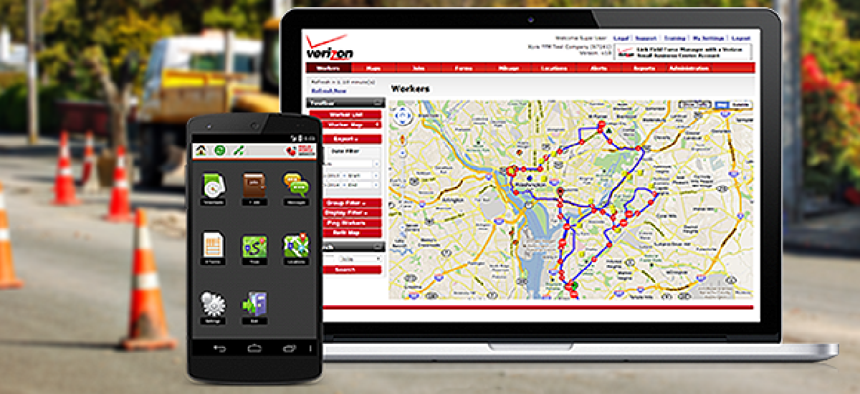GPS, geofencing drive highway department efficiency

The highway department in Cheektowaga, N.Y., uses cloud-based mobile management tools created by Xora for GPS tracking and vehicle trip auditing, mileage management and more.
The 88,000 residents of the town of Cheektowaga, nestled in upstate New York near the Canadian border, have an advantage when it comes to services deployment that even their larger neighbors might envy.
Downed trees are quickly cleared from roadways. Snowplows never leave anyone behind. Damaged street signs and waterway hazards are quickly dealt with. That's because as soon as any problem is reported, the closest crew equipped to handle the job is efficiently dispatched to fix it.
But that wasn't always the case. Mike Lamadue, deputy highway superintendent for Cheektowaga explained that for many years, the 400 miles of road and waterways the town maintains were managed using a manual, paper-based system. And that sometimes meant a long delay before a problem like a downed tree lying across a street could get fixed.
Cheektowaga needed a more efficient way to manage the 72 employees and 63 vehicles in its highway maintenance fleet. Managers looked at several different solutions, including one with dedicated wireless devices, like a supplemental radio, which could be dropped into vehicles. But signal problems along the Canadian border and interference close to the town's airport eliminated most of those options. In the end, Cheektowaga choose the Verizon Field Force Manager software, which combines standard cell phones operating on the Verizon network with a suite of cloud-based mobile management tools created by Xora, a ClickSoftware company.
The software, delivered as a service, has many components, giving towns and municipalities the option to deploy it in stages as their needs evolve, said Howard Latham, Xora’s vice president of sales and customer success. Modules include GPS tracking and vehicle trip auditing, mileage management, job dispatching, mobile forms processing, a proof of delivery application and electronic time card management.
"It's very highly configurable," Latham said. "When we get new customers, we go through an on-boarding process with them to help them configure exactly what they need."
Costs vary depending on the number of users and how many modules are installed, but they generally range between $15 to $25 per worker, per month.
Although the Verizon-branded version of the Xora software in Cheektowaga works on the Verizon network, the platform can be deployed with any wireless carrier's phones. One advantage of the Verizon partnership is that Xora is often given early access to new Verizon phones, Latham said, which allows the company to certify that new devices are able to both run the software and properly access the GPS data used for tracking.
Cheektowaga has so far set up GPS tracking and geofencing. From his office computer, Lamadue can see where all the vehicles in the fleet are currently located and exactly where they have been. Although the entire town has implemented the program, Xora is able to break larger data sets down by department or group, allowing Lamadue to track only the vehicles and people who work in his department,
"We deployed it as a cell phone that is inside a lock box in the vehicles," Lamadue said. "We love the system. It's like having 1,000 eyes all over town."
Those eyes come in handy for both protecting and auditing workers and for helping to provide better government transparency, Lamadue said. Now when people call in with a problem, they can be told where the closest repair vehicle is located and how quickly it can be dispatched.
The program also gives Cheektowaga the ability to audit employee performance, which in some cases can absolve employees from blame in complaints. For example, if someone complains that a snowplow truck is driving too fast, the town can check the data for the plow’s actual speed. Or if someone complains that he sees town workers wasting time, the data can be checked to see if those workers spotted are even employed by the town at all -- they could be from a contractor whose workers wear similar uniforms or safety gear.
Another way that Lamadue uses Xora is geofencing. There are 25 different routes snowplows take through town when clearing roads, and during this last harsh winter, they were all used quite a lot. Xora kept the trucks on their correct routes and allowed on-the-fly changes to be made based on conditions. For example, if one truck finished its route early and others were having trouble, the free truck would be directed to help out without any overlap or duplication.
Even just using the base module, the highway department estimates that it's saving $100,000 a year by streamlining employee travel and by completing jobs more quickly and efficiently, leading to less overtime pay. Cheektowaga is considering moving to a second stage of their program with Xora, where more features will be implemented.
Given the simplicity of the user interface, Lamadue doesn't anticipate any problems if more Xora models are brought online. "Everything is very user friendly," he said. "You don’t really need any training to make it work."
NEXT STORY: 4 technologies that changed software development





